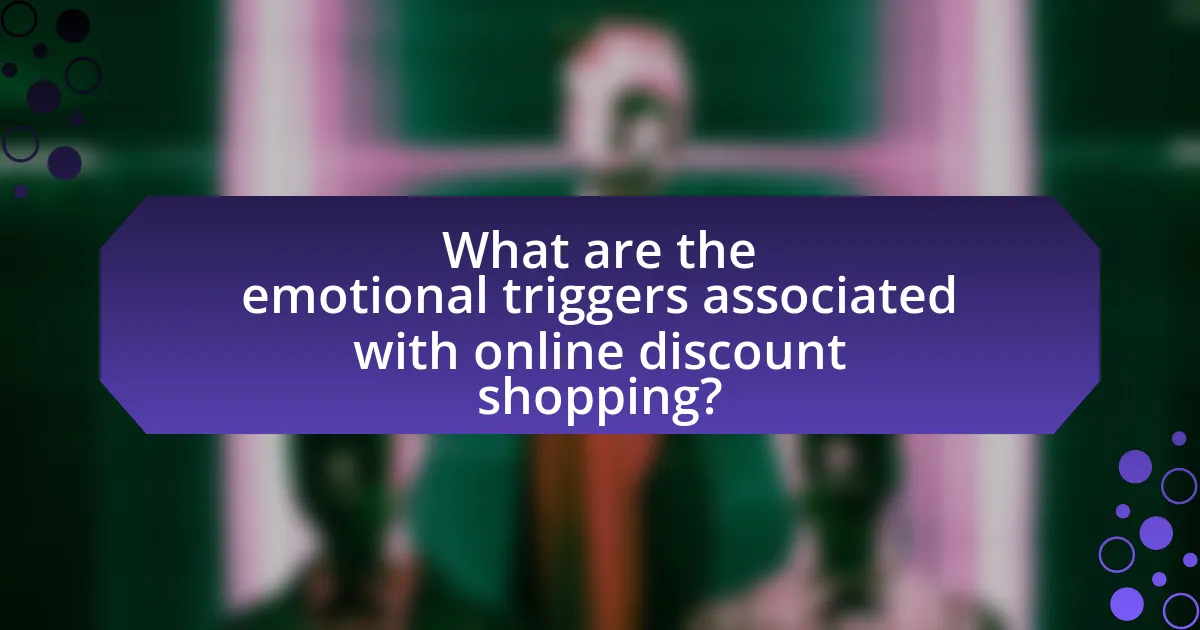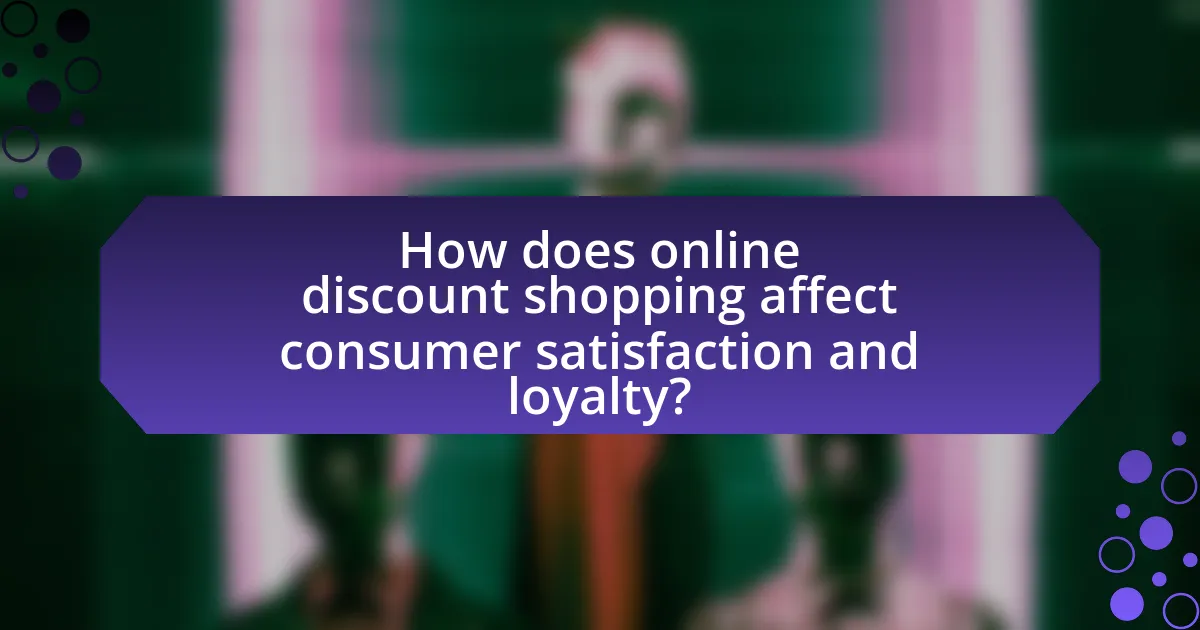The article explores the psychology behind online discount shopping, focusing on key concepts such as perceived value, scarcity, and instant gratification. It examines how psychological principles influence consumer behavior, including cognitive biases like the anchoring effect and scarcity bias, which drive impulsive purchasing decisions. The role of emotional triggers, such as excitement and the fear of missing out (FOMO), is also discussed, highlighting their impact on buying habits. Additionally, the article addresses the effects of discounts on consumer satisfaction, loyalty, and potential downsides, including buyer’s remorse and financial implications. Practical tips for enhancing the online discount shopping experience are provided, emphasizing strategies to avoid impulsive buying.

What is the Psychology Behind Online Discount Shopping?
The psychology behind online discount shopping is primarily driven by the concepts of perceived value, scarcity, and the desire for instant gratification. Consumers often perceive discounted prices as a signal of value, leading them to believe they are making a smart financial decision. Research indicates that discounts can trigger a sense of urgency due to the fear of missing out, which is linked to the scarcity principle; when items are labeled as limited-time offers, shoppers are more likely to make impulsive purchases. Additionally, the convenience of online shopping enhances the immediate satisfaction of acquiring goods at a lower price, reinforcing positive feelings associated with the purchase. Studies show that 70% of consumers are influenced by discounts, highlighting their significant impact on buying behavior.
How do psychological principles influence consumer behavior in online shopping?
Psychological principles significantly influence consumer behavior in online shopping by affecting decision-making processes and perceptions of value. For instance, the principle of scarcity, which suggests that limited availability increases desirability, is often employed in online retail through countdown timers or limited stock notifications, prompting consumers to make quicker purchasing decisions. Additionally, the principle of social proof, where individuals look to others’ behaviors to guide their own, is leveraged through customer reviews and ratings, enhancing trust and encouraging purchases. Research by Cialdini (2009) highlights that these psychological triggers can lead to increased sales, demonstrating their effectiveness in shaping consumer behavior in the digital marketplace.
What cognitive biases affect decision-making during online discount shopping?
Cognitive biases that affect decision-making during online discount shopping include the anchoring effect, scarcity bias, and the bandwagon effect. The anchoring effect occurs when consumers rely heavily on the initial price they see, which influences their perception of the discount’s value. Scarcity bias leads shoppers to perceive items as more valuable when they are presented as limited in availability, prompting quicker purchasing decisions. The bandwagon effect causes individuals to follow the purchasing behavior of others, believing that popular items are more desirable. Research indicates that these biases significantly impact consumer behavior, with studies showing that perceived scarcity can increase purchase intent by up to 50%.
How does the perception of value impact purchasing decisions?
The perception of value significantly influences purchasing decisions by shaping consumers’ beliefs about the benefits they receive relative to the cost. When consumers perceive a product as offering high value, they are more likely to make a purchase, as they believe the benefits outweigh the price. Research indicates that 70% of consumers are willing to pay more for a product they perceive as high quality, demonstrating that perceived value directly correlates with willingness to spend. Additionally, factors such as brand reputation, product quality, and customer reviews enhance the perception of value, further driving purchasing behavior.
Why do consumers seek discounts when shopping online?
Consumers seek discounts when shopping online primarily to save money. This behavior is driven by the desire to maximize value while minimizing expenditure, as discounts create a perception of getting more for less. Research indicates that 70% of consumers are motivated by price reductions when making online purchases, highlighting the significant impact of discounts on buying decisions. Additionally, the psychological principle of scarcity plays a role; limited-time offers can create urgency, prompting consumers to act quickly to secure savings. This combination of financial incentive and psychological triggers explains why discounts are a key factor in online shopping behavior.
What role does scarcity play in the desire for discounts?
Scarcity significantly heightens the desire for discounts by creating a sense of urgency among consumers. When products are perceived as limited in availability, individuals are more likely to act quickly to secure a deal, fearing they may miss out. Research indicates that scarcity can trigger emotional responses, leading to increased motivation to purchase; for instance, a study published in the Journal of Consumer Research found that limited-time offers can enhance perceived value and desirability. This psychological phenomenon is rooted in the principle of loss aversion, where the fear of losing an opportunity outweighs the potential benefits of waiting for a better deal.
How does social proof influence discount shopping behavior?
Social proof significantly influences discount shopping behavior by creating a perception of value and urgency among consumers. When shoppers observe others purchasing discounted items or leaving positive reviews, they are more likely to feel compelled to buy those products themselves, believing that the discounts are a sign of quality or popularity. Research indicates that 70% of consumers are influenced by the reviews and ratings of others when making purchasing decisions, highlighting the power of social proof in driving sales during discount events. This phenomenon is particularly evident in online shopping environments, where user-generated content and testimonials can enhance the perceived legitimacy of discounts, leading to increased conversion rates.

What are the emotional triggers associated with online discount shopping?
The emotional triggers associated with online discount shopping include feelings of excitement, urgency, and satisfaction. Excitement arises from the anticipation of finding a good deal, which can stimulate dopamine release in the brain, reinforcing the shopping behavior. Urgency is often created through limited-time offers or scarcity tactics, prompting consumers to act quickly to avoid missing out, a phenomenon supported by the fear of loss. Satisfaction is derived from the perceived value gained through discounts, leading to a sense of accomplishment and happiness when making a purchase. Research indicates that these emotional responses significantly influence consumer behavior, driving increased engagement and spending in online retail environments.
How do emotions drive the decision to purchase discounted items?
Emotions significantly influence the decision to purchase discounted items by creating a sense of urgency and excitement. When consumers perceive a discount, they often experience positive emotions such as joy and satisfaction, which can lead to impulsive buying behavior. Research indicates that feelings of scarcity and the fear of missing out (FOMO) can heighten emotional responses, prompting individuals to act quickly to secure perceived savings. A study published in the Journal of Consumer Research found that consumers are more likely to buy discounted items when they feel a strong emotional connection to the product, as emotions can enhance the perceived value of the deal.
What feelings are commonly associated with finding a good deal?
Finding a good deal commonly evokes feelings of excitement, satisfaction, and relief. Excitement arises from the thrill of discovering a bargain, often leading to a rush of positive emotions. Satisfaction is felt when consumers perceive they have made a wise financial decision, reinforcing their sense of value. Relief often accompanies the realization that they have saved money, alleviating financial stress. Research indicates that these emotions are linked to the brain’s reward system, where the anticipation of saving money activates pleasure centers, enhancing the overall shopping experience.
How does the fear of missing out (FOMO) affect online shopping habits?
The fear of missing out (FOMO) significantly influences online shopping habits by driving consumers to make impulsive purchases to avoid perceived loss. Research indicates that FOMO can lead to increased urgency in buying decisions, as shoppers feel compelled to act quickly on limited-time offers or exclusive deals. A study published in the Journal of Consumer Research found that individuals experiencing FOMO are more likely to engage in spontaneous buying behavior, often leading to higher spending. This psychological trigger creates a sense of urgency, prompting consumers to prioritize immediate gratification over thoughtful decision-making, ultimately shaping their online shopping experiences.
What psychological strategies do retailers use to promote discounts?
Retailers use several psychological strategies to promote discounts, including scarcity, anchoring, and social proof. Scarcity creates urgency by suggesting limited availability, prompting consumers to act quickly to secure a deal. For example, phrases like “only 2 left in stock” can drive immediate purchases. Anchoring involves presenting a higher original price alongside the discounted price, making the discount appear more significant and appealing. Research shows that consumers are more likely to perceive a discount as valuable when they see a marked-down price next to a higher reference price. Social proof leverages the influence of others by showcasing customer reviews or highlighting how many people have purchased an item, reinforcing the idea that the discount is a popular choice. These strategies effectively manipulate consumer perceptions and behaviors, leading to increased sales during discount promotions.
How do pricing strategies impact consumer perception of discounts?
Pricing strategies significantly influence consumer perception of discounts by shaping expectations and perceived value. For instance, when retailers employ high initial prices followed by substantial discounts, consumers often perceive the discounted price as a better deal, enhancing their satisfaction and likelihood of purchase. Research indicates that consumers are more likely to buy when they believe they are receiving a significant discount, as seen in a study by Grewal et al. (2010), which found that perceived savings can increase purchase intentions. Additionally, psychological pricing tactics, such as charm pricing (e.g., pricing items at $9.99 instead of $10), can further enhance the perception of discounts, making consumers feel they are getting a better value. Thus, effective pricing strategies can create a favorable perception of discounts, driving consumer behavior and sales.
What marketing techniques enhance the appeal of discounts?
Marketing techniques that enhance the appeal of discounts include scarcity tactics, social proof, and personalized messaging. Scarcity tactics, such as limited-time offers or low stock alerts, create urgency, prompting consumers to act quickly to secure the discount. Research shows that urgency can increase conversion rates by up to 332%. Social proof, such as displaying customer reviews or testimonials, builds trust and encourages potential buyers to take advantage of discounts, as they see others benefiting from the offer. Personalized messaging, which tailors discounts based on user behavior or preferences, can increase engagement and conversion rates by 20% or more, as consumers feel the offer is specifically relevant to them. These techniques leverage psychological triggers that drive consumer behavior, making discounts more appealing.

How does online discount shopping affect consumer satisfaction and loyalty?
Online discount shopping positively affects consumer satisfaction and loyalty by providing perceived value and enhancing the shopping experience. Consumers often feel a sense of accomplishment and happiness when they secure discounts, which can lead to increased satisfaction with their purchases. Research indicates that 70% of consumers report higher satisfaction levels when they perceive they are getting a good deal. This satisfaction fosters loyalty, as satisfied customers are more likely to return to the same online retailer for future purchases. Additionally, loyalty programs that reward repeat purchases can further enhance this effect, as they create a cycle of positive reinforcement that encourages ongoing engagement with the brand.
What is the relationship between discounts and customer satisfaction?
Discounts positively influence customer satisfaction by enhancing perceived value and encouraging purchase behavior. When customers perceive they are receiving a good deal, their satisfaction levels increase, leading to a greater likelihood of repeat purchases. Research indicates that 70% of consumers report feeling happier when they receive discounts, as noted in a study published in the Journal of Retailing. This correlation suggests that discounts not only drive immediate sales but also foster long-term customer loyalty and satisfaction.
How do discounts influence repeat purchases and brand loyalty?
Discounts significantly enhance repeat purchases and brand loyalty by creating a perception of value and encouraging customer retention. When consumers perceive they are receiving a good deal, they are more likely to make additional purchases, as evidenced by a study from the Journal of Retailing, which found that 60% of consumers reported being more likely to return to a brand that offers discounts. Furthermore, discounts can foster emotional connections with a brand, as customers feel appreciated and rewarded, leading to increased loyalty. Research from the Harvard Business Review indicates that loyal customers are worth up to ten times as much as their first purchase, highlighting the long-term financial benefits of discount strategies.
What long-term effects do discounts have on consumer trust?
Discounts can lead to a decrease in consumer trust over the long term. When consumers frequently encounter discounts, they may begin to perceive the original prices as inflated, leading to skepticism about the retailer’s pricing strategies. Research indicates that consistent discounting can create a perception of lower quality or value, as consumers may associate frequent sales with desperation or a lack of confidence in the product’s worth. A study published in the Journal of Retailing found that consumers who regularly see discounts may question the authenticity of the brand and its commitment to quality, ultimately diminishing their trust in the retailer.
What are the potential downsides of online discount shopping?
The potential downsides of online discount shopping include the risk of impulse buying, lower product quality, and increased likelihood of fraud. Impulse buying can occur due to the ease of access and the allure of discounts, leading consumers to purchase items they do not need. Research indicates that 70% of online shoppers admit to making unplanned purchases, often driven by promotional offers. Additionally, discounted products may be of inferior quality, as retailers may reduce prices to clear out unsold inventory or to compete with other sellers. A study by the Consumer Reports found that 30% of consumers reported receiving products that did not meet their expectations after purchasing discounted items online. Lastly, the anonymity of online transactions increases the risk of fraud, with the Federal Trade Commission reporting that online shopping scams have risen by 70% in recent years.
How can excessive discount shopping lead to buyer’s remorse?
Excessive discount shopping can lead to buyer’s remorse because consumers may feel regret after realizing they purchased items they do not need or will not use. This behavior often stems from the psychological phenomenon known as “loss aversion,” where the fear of missing out on a deal can override rational decision-making. Research indicates that 70% of consumers experience buyer’s remorse, particularly when they buy impulsively during sales events, leading to feelings of guilt and dissatisfaction. Additionally, the accumulation of unnecessary items can create clutter, further exacerbating feelings of regret and anxiety about financial decisions.
What impact does discount shopping have on financial well-being?
Discount shopping positively impacts financial well-being by allowing consumers to save money on purchases, which can lead to increased disposable income. Research indicates that consumers who engage in discount shopping often experience a sense of satisfaction and reduced financial stress, as they can acquire desired goods at lower prices. A study published in the Journal of Consumer Research found that individuals who utilize discounts effectively manage their budgets and report higher levels of financial security. This behavior not only enhances immediate savings but also contributes to long-term financial stability by enabling consumers to allocate funds toward savings or debt reduction.
What practical tips can enhance the online discount shopping experience?
To enhance the online discount shopping experience, consumers should utilize price comparison tools, subscribe to retailer newsletters, and take advantage of cashback websites. Price comparison tools allow shoppers to quickly identify the best deals across multiple platforms, ensuring they do not miss out on significant savings. Subscribing to retailer newsletters often provides exclusive discounts and early access to sales, which can lead to better deals. Cashback websites offer a percentage of the purchase back to the consumer, effectively reducing the overall cost of items purchased. According to a study by the National Retail Federation, 75% of consumers reported using coupons or discounts when shopping online, highlighting the importance of these strategies in maximizing savings.
How can consumers effectively find and utilize discounts online?
Consumers can effectively find and utilize discounts online by leveraging various strategies such as using coupon websites, subscribing to newsletters, and utilizing browser extensions. Coupon websites like RetailMeNot and Honey aggregate discounts from multiple retailers, making it easier for consumers to find deals in one place. Subscribing to newsletters from favorite brands often provides exclusive discounts and early access to sales, which can lead to significant savings. Additionally, browser extensions like Honey automatically apply the best coupon codes at checkout, ensuring consumers do not miss out on potential savings. According to a study by the National Retail Federation, 80% of consumers reported using coupons or discounts when shopping online, highlighting the effectiveness of these strategies in maximizing savings.
What strategies can help avoid impulsive buying during discount shopping?
To avoid impulsive buying during discount shopping, consumers can implement strategies such as setting a budget, creating a shopping list, and delaying purchases. Setting a budget helps limit spending to a predetermined amount, reducing the likelihood of overspending. Creating a shopping list ensures that only necessary items are purchased, minimizing distractions from enticing discounts on non-essential products. Delaying purchases for a set period, such as 24 hours, allows consumers to evaluate whether the item is truly needed, which can significantly decrease impulsive decisions. Research indicates that consumers who employ these strategies are less likely to experience buyer’s remorse and financial strain, as they make more deliberate purchasing choices.



